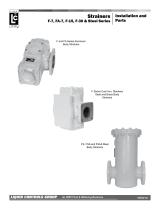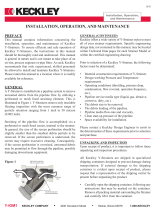Page is loading ...

IOM 900 & 950B 06/2011 REV A. Page 1 of 4
Installation, Operation & Maintenance Manual
Model 900 & 950B Duplex Basket Strainer
TABLE OF CONTENTS
Introduction ...................................................................... 1
Receiving, Handling, and Inspection ................................. 2
Installation ......................................................................... 2
Start Up ............................................................................. 2
Basket Removal, Cleaning, and Replacement ................... 3
Shut Down ......................................................................... 4
Recommended Spare Parts ............................................... 4
INTRODUCTION
A duplex strainer is a device installed in a pipeline to
remove dirt and other unwanted debris from fluids.
Straining is accomplished by directing the fluid through
sized openings in a basket. Duplex strainers are installed
where fluid flow cannot be interrupted while the basket
is removed for cleaning. Duplex strainers are designed to
withstand the rated pressure of the piping system.
Standard Model 900 and 950B strainers up to and
including 14” pipe sizes ship fully assembled. Secure the
strainer before moving and move as a single unit. Model
900 and 950B strainers sizes 26” and larger are shipped
disassembled. See Sales Drawing for assembly
arrangement
Read all the following information and instructions prior to installing and operating the equipment.
Failure to comply with these instructions could result in bodily injury or property damage.
mdi - Manufacturers Distributor, Inc Phone: (727) 835 - 0665 | Fax: (813) 571 – 0422 Strainers.mdiSales.com | [email protected]

IOM 900 & 950B 06/2011 REV A. Page 2 of 4
Installation, Operation & Maintenance Manual
Model 900 & 950B Duplex Basket Strainer
RECEIVING, HANDLING, AND INSPECTION
1. After unpacking, inspect strainer for damage incurred
during transit. Report any damage to the carrier
immediately. If the strainer is not to be installed
immediately, store indoors in a clean, dry environment and
replace protective wrap, flange protectors, etc. which may
have been removed during receiving, handling and
inspection.
2. Remove preservative with solvent-dampened cloth.
Exercise care when using solvent and follow solvent
manufacturer’s instructions.
3. Check to be sure the rated pressure and temperature on
the strainer nameplate is not less than the maximum
pressure and temperature of the installation. The rated
pressure shown on the nameplate is the maximum
pressure, including shock, at which the strainer may be
operated.
4. Open the strainer covers (removing the cover nuts, Bolted
Cover; loosening bolt nuts, Quick Opening Cover—see
manufacturer’s instructions.) Lift or swing the cover away
until it is free of basket well.
5. Verify each basket handle has sufficient height that it is
compressed when the cover is bolted closed. Remove
basket and flange/nozzle protectors and check the inside
of the body for any foreign or loose material that could be
carried down stream when fluid is introduced into the
strainer. Remove this material and replace basket.
6. Close and bolt covers (cover nuts & studs, Bolted Cover;
bolt nuts, Quick Opening Cover.) Ensure that the sealing
surfaces are clean. The gasket or O-ring is to be seated
properly before tightening the cover hardware.
INSTALLATION
CAUTION: Before installation, review the
application and chemical compatibility of the
process fluid to all the materials of construction
and components of the strainer.
1. Remove protective wraps, caps, plugs etc. before installing
the strainer into operation after storage. Be sure to inspect
cover gasket or O-ring for possible damage and replace as
required.
2. Standard Model 900 strainers up to and including 14” pipe
size ship fully assembled. Ensure the strainer is secured
before moving and move as a single unit. Strainers 16” and
larger are shipped disassembled. See Sales Drawing for
assembly arrangement. Position strainer components in
place and secure with strainer hardware. Use standard
piping practice for assembly.
3. Position the strainer in the pipeline so that the fluid enters
the connection marked “IN” or “INLET.” Be sure sufficient
clearance is provided for easy opening of the covers and
removal of strainer baskets. Refer to the Sales Drawing for
removal clearances. Support the strainer firmly in place.
CAUTION: Strainers are not designed to be
anchor supports in the pipeline. Be sure to
properly support process piping on both sides
of the strainer. Use care to prevent piping
forces and movements from acting on the strainer
connections. Damage may occur to strainer if improperly
connected.
4. Connect the strainer line flanges to the piping. Be sure to
use the same type flange faces. Do not bolt a raised face
flange to a flat face flange. Be sure flange gaskets are in
place and fasteners are tight. On strainers with other line
connections, use standard piping practice when installing.
5. Pressure gauges near the strainer inlet and outlet are
required to determine differential pressure across the
strainer and cleaning frequency. Pressure gauges are
essential for the safe operation of the strainer.
START UP
CAUTION: To protect the operator when
draining and venting, the fluid must be piped to
a safe area. This is a requirement for all fluids
and for water with a temperature above 120˚F.
The operator should wear appropriate protective
equipment (goggles, gloves, vest, clothing etc.) consistent with
the process fluid for strainer operation and servicing.
mdi - Manufacturers Distributor, Inc Phone: (727) 835 - 0665 | Fax: (813) 571 – 0422 Strainers.mdiSales.com | [email protected]

IOM 900 & 950B 06/2011 REV A. Page 3 of 4
Installation, Operation & Maintenance Manual
Model 900 & 950B Duplex Basket Strainer
START UP (CONTINUED)
1. Open all vents, if provided, and slowly allow fluid to enter
the strainer. First, slowly open the downstream valve
nearest to strainer outlet. Then slowly open the upstream
valve nearest to the strainer inlet.
2. Open all strainer valves.
3. Close all vents when air is expelled.
4. Close the two (2) valves that isolate the off-line strainer
housing.
BASKET REMOVAL, CLEANING,
AND REPLACEMENT
CAUTION: To prevent damage to the basket, DO
NOT permit the differential pressure across the
strainer to exceed 20 psi.
1. A differential pressure increase of 5 psi over the
clean (initial) differential pressure across the strainer
indicates that the basket of the on-line strainer
housing is debris-laden and requires removal and
cleaning.
CAUTION: To protect the operator when
draining and venting, the fluid must be piped to
a safe area. This is a requirement for all fluids
and for water with a temperature above 120˚F.
The operator should wear appropriate protective equipment
(goggles, gloves, vest, clothing etc.) consistent with the process
fluid for strainer operation and servicing.
2. Slowly open the two (2) valves that isolate the off-line
strainer housing and slowly close the two (2) valves that
isolate the on-line strainer housing with the debris-laden
basket. This step ensures continuous operation of the
process.
3. For the strainer housing with the debris-laden basket,
slowly open the drain and vent as provided. This relieves
the pressure and drains fluid in the basket well.
4. When pressure is relieved and fluid drained, open the
cover of the strainer housing that contains the debris-
laden basket. Lift or swing this cover away until it is free
of basket well.
BASKET REMOVAL, CLEANING,
AND REPLACEMENT (CONTINUED)
5. Remove the debris-laden basket. Invert the basket and
wash out the debris. Direct a stream of air, water, or steam
from the exterior of the basket to the interior.
NOTE: Do not permit the basket debris to dry, as
it would be difficult to remove and clean the
basket.
6. Inspect the basket at each cleaning for damage (holes, tear
etc.). Replace as needed with genuine Eaton baskets.
7. Place the cleaned or new basket into the basket well. Take
extra care to ensure that the basket ring rests squarely on
the retaining ring in the basket well.
8. Be sure basket handle is sufficiently high to be compressed
by the cover.
9. Inspect cover gasket or O-ring and sealing surfaces. Clean
sealing surfaces and replace gasket or O-ring as necessary
with genuine Eaton parts.
10. Reseat the cover. Close and bolt covers (cover nuts and
studs, Bolted Cover; bolt nuts, Quick Opening Cover).
Ensure that the sealing surfaces are clean. The gasket or O-
ring is to be seated properly before tightening the cover
hardware.
11. Close the drain and vent that were opened.
12. Refill this newly cleaned strainer basket housing by partially
opening the two (2) valves that isolate this strainer basket
housing very slowly.
13. Slowly fill the strainer basket housing with working fluid.
Ensure that all air is expelled from the strainer basket
housing. Opening of venting may be required.
14. When air is expelled, close any venting that was opened.
15. Close the two (2) valves that were partially opened to refill
the strainer basket housing. This strainer basket housing is
now off-line and is isolated from the on-line strainer
housing.
mdi - Manufacturers Distributor, Inc Phone: (727) 835 - 0665 | Fax: (813) 571 – 0422 Strainers.mdiSales.com | [email protected]

IOM 900 & 950B 06/2011 REV A. Page 4 of 4
Installation, Operation & Maintenance Manual
Model 900 & 950B Duplex Basket Strainer
SHUT DOWN PROCEDURE
(TAKING THE STRAINER OUT OF SERVICE)
1. Slowly close the pipeline valves upstream and
downstream from the strainer. Make sure these
valves are tightly closed. Open all valves between
the two strainer housings.
CAUTION: To protect the operator when
draining and venting, the fluid must be
piped to a safe area. This is a requirement
for all fluids and for water with a
temperature above 120˚F. The operator should wear
appropriate protective equipment (goggles, gloves, vest,
clothing etc.) consistent with the process fluid for strainer
operation and servicing.
2. To relieve fluid pressure, first open the drains at the
bottom of each strainer housing and then open any vents,
if provided.
3. Proceed to clean and inspect the strainer. Inspect the
strainer to insure there is no standing fluid.
RECOMMENDED SPARE PARTS
1- Eaton Replacement Basket
1- Eaton Replacement Gasket
When ordering spare parts, be sure to specify all nameplate
data as well as description and quantity of parts.
Always use genuine Eaton replacement parts for guaranteed
fit and performance.
Visit our web site, www.EatonFiltrationSales.com, for information
about the different types of Eaton Duplex Basket Strainers.
Eaton
North America — HQ
70 Wood Avenue, South
2nd Floor
Iselin, NJ 08830
Toll Free: (800) 656-3344
(North America only)
Voice: (732) 767-4200
Fax: ( 952) 906-3706
Eaton
Brazil
Av. Julia Gaioli, 474 –
Bonsucesso
07251-500 – Guarulhos
Brazil
Voice: +55 (11) 2465-8822
Fax: +55 (11) 2465-8884
Eaton
Singapore
4 Loyang Lane #04-01/02
Singapore 508914
Voice: +65-6825-1668
Fax: +65-6825-1639
Eaton
Europe/Africa/Middle East
Auf der Heide 2
53947 Nettersheim
Germany
Voice: +49-2486-809-0
Fax: +49-2486-809-800
Eaton
China
No.3, Lane 280, Linhong Road
Changning District, 200335
Shanghai, P.R. China
Voice: +86-21-5200-0099
Fax: +86-21-5200-0400
WARRANTY
All products manufactured by Seller are warranted against defects in material and
workmanship under normal use and service for which such products were designed for a period
of eighteen (18) months after shipment from our factory or twelve (12) months after start-up,
whichever comes first. OUR SOLE OBLIGATION UNDER THIS WARRANTY IS TO REPAIR OR
REPLACE, AT OUR OPTION, ANY PRODUCT OR ANY PART OR PARTS THEREOF FOUND TO BE
DEFECTIVE. SELLER MAKES NO OTHER REPRESENTATION OR WARRANTY, EXPRESS OR IMPLIED,
INCLUDING, BUT NOT LIMITED TO, ANY IMPLIED WARRANTY OF MERCHANTABILITY OR FITNESS
FOR A PARTICULAR PURPOSE. WE SHALL NOT BE LIABLE FOR CARTAGE, LABOR,
CONSEQUENTIAL DAMAGES OR CONTINGENT LIABILITIES. OUR MAXIMUM LIABILITY SHALL NOT
IN ANY EVENT EXCEED THE CONTRACT PRICE FOR THE PRODUCT.
mdi - Manufacturers Distributor, Inc Phone: (727) 835 - 0665 | Fax: (813) 571 – 0422 Strainers.mdiSales.com | [email protected]
/

